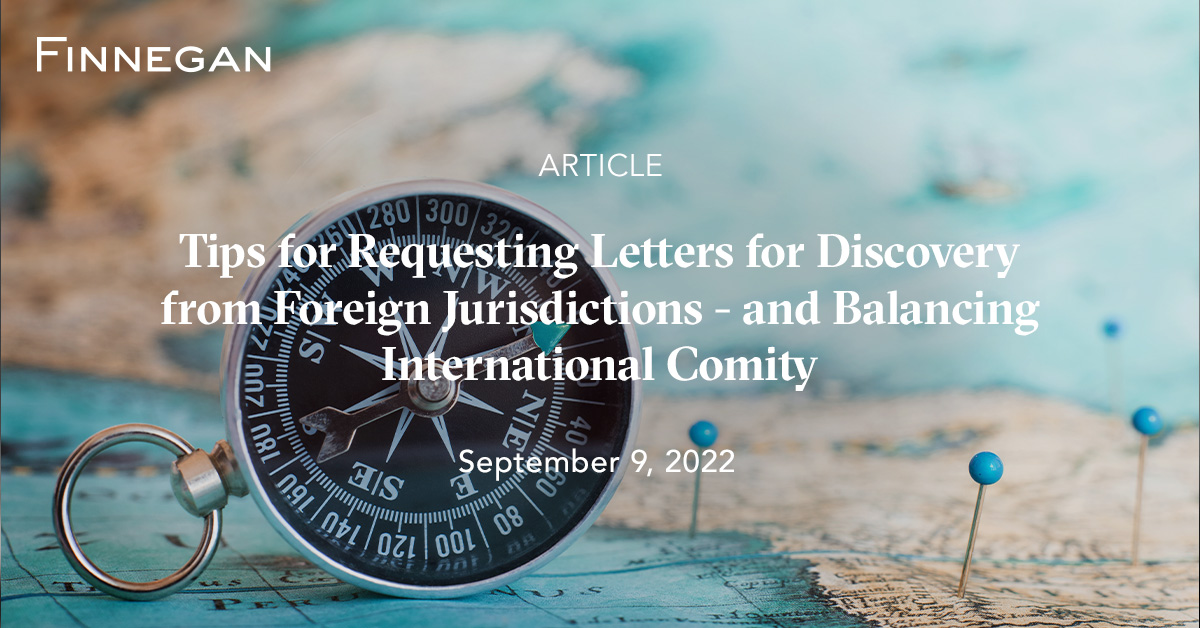Letters Rogatory Explained: Facilitating Legal Cooperation Between Countries

Meaning of Letters Rogatory
Letters rogatory are official demands made by a court in one territory to a court in another territory, looking for aid in getting proof or testimony for a lawful case. This step-by-step system is important in the context of global law, where legal systems might vary, and cross-border teamwork is necessary. Letters rogatory help with the celebration of information that may be critical for settling cases, particularly in circumstances involving complex global concerns.
Generally, these demands emerge in civil, criminal, or administrative issues where a celebration needs evidence that lies outside the territory of the asking for court. The letters serve as a way to make sure that the concepts of due process are supported, allowing courts to gain access to evidence that might otherwise stay unattainable as a result of lawful or geographical obstacles.
Making use of letters rogatory is regulated by worldwide treaties, bilateral contracts, or domestic legislations, which delineate the procedures and responsibilities of the courts involved. It is very important to note that the implementation of such requests is not guaranteed; they rely on the legislations and methods of the jurisdiction receiving the letter. Thus, letters rogatory are a critical tool for fostering lawful cooperation and ensuring justice throughout boundaries.
The Process of Issuing Letters Rogatory
Issuing letters rogatory includes a structured procedure that makes sure compliance with both domestic and global legal requirements. The asking for celebration, normally a court or legal authority, drafts an official request outlining the nature of the support sought, the proof or information required, and the lawful basis for the demand. This file must be specific to assist in understanding by the foreign territory.

The next action entails sending the letters rogatory to the marked international authority. This is usually done with polite channels or international legal aid structures, ensuring that the demand is gotten and acknowledged by the foreign court. The foreign court then processes the demand according to its very own legal procedures, eventually replying to the requesting party with the sought-after details or proof, therefore assisting in international lawful teamwork.
Importance in International Law
The value of letters rogatory in global legislation can not be overstated, as they serve as an important mechanism for judicial cooperation throughout borders. These official demands for assistance in legal matters permit courts in one jurisdiction to look for details, evidence, or the existence of witnesses from another territory, consequently helping with the management of justice in multinational instances.
Letters rogatory are specifically essential in the context of globalization, where lawful disputes often extend numerous nations. They enable the collection of proof that might or else be hard to reach, guaranteeing that lawful proceedings are notified and reasonable. By fostering collaboration in between judicial systems, letters rogatory help promote the policy of legislation and advertise mutual respect among countries.
Furthermore, using letters rogatory demonstrates a commitment to global norms and principles of collaboration, reflecting the interconnected nature of contemporary legal techniques. It illustrates the importance of adhering to well established procedures and treaties, such as the Hague Convention, which offers a framework for these demands - Letters rogatory. Inevitably, letters rogatory enhance the effectiveness of lawful procedures, guaranteeing that justice is not impeded by geographical borders
Challenges and Limitations
Despite their importance, letters rogatory face a number of obstacles and constraints that can impede their effectiveness. One main issue is the differing lawful structures and treatments across territories, which can cause misunderstandings and delays in the implementation of requests. Different countries might have unique requirements for the legitimacy of letters rogatory, making complex the process better.
In addition, the commonly protracted nature of international legal collaboration can prevent timely access to proof or witnesses. This delay may adversely impact ongoing investigations or lawful process, especially in instances requiring urgent activity. The lack of resources and training in some jurisdictions can result in not enough additional info handling of requests, leading to inadequate or incomplete feedbacks.
Cultural distinctions and varying attitudes towards legal processes can additionally position substantial obstacles. For instance, countries with less official lawful systems may have a hard time to adhere to the step-by-step rigor anticipated in letters rogatory. Political tensions in between nations can affect the determination to perform demands, resulting in a lack of collaboration and reducing the energy of this mechanism in international legislation. These obstacles necessitate continuous discussion and reform to improve the efficiency of letters rogatory in lawful cooperation.
Study and Examples

Alternatively, difficulties can develop, as seen in an instance entailing a European nation seeking evidence in a continuous criminal issue from a non-EU nation - Letters rogatory. The procedure was delayed due to governmental obstacles and varying lawful requirements, ultimately preventing the examination
These examples show that while letters rogatory can promote international participation and accelerate lawful proceedings, they likewise highlight the need for clear interaction and understanding of legal structures between nations. Such study highlight the value of refining this device to enhance effectiveness and effectiveness in global lawful matters.
Conclusion
In summary, letters rogatory work as an important system for facilitating legal collaboration between countries, making sure the collection of evidence and testimony across jurisdictions. Their importance in international legislation can not be overstated, as they advertise due procedure and boost the performance of cross-border lawful procedures. Challenges such as varying lawful frameworks and political tensions might hinder their effectiveness. Proceeded initiatives to enhance and improve the process are crucial for promoting more powerful global judicial cooperation.
Letters rogatory are official requests made by a court in one territory to a court in an additional jurisdiction, seeking assistance in obtaining proof or testament for a lawful case. The requesting party, typically a court or lawful authority, drafts an official demand outlining the nature of the support looked for, the evidence or details needed, and the legal basis for the request. The international court then processes the Full Article request according to its own legal treatments, inevitably responding to the asking for event with the in-demand details or evidence, therefore helping with international lawful teamwork.
In addition, the use of letters rogatory demonstrates a dedication to worldwide standards and concepts of participation, showing the interconnected nature of modern-day legal techniques.Global lawful collaboration with letters rogatory is not without its real-world ramifications, as shown by various situation researches that highlight both successes and difficulties.
Comments on “Discovering the Historical Background of Letters Rogatory in Legal Frameworks”